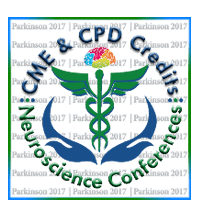
Aimee J Nelson
McMaster University, Canada
Title: Somatosensory abnormalities in Parkinson’s disease and evidence from functional neuroimaging
Biography
Biography: Aimee J Nelson
Abstract
Individuals with Parkinson’s disease (PD) demonstrate abnormalities in somatosensory perception and physiology. Impairments in tactile acuity are well documented for both temporal and spatial perception, and physiological changes are also apparent. Identifying and understanding the origin of somatosensory abnormalities will aid in the treatment of PD. The present research investigates the physiological changes in primary somatosensory cortex that accompany PD, and relates these findings to alterations in brain circuits that mediate sensorimotor integration and tactile perception. Ten individuals with PD were studied on dopaminergic medications and following overnight withdrawal. Data were compared with that obtained from 10 aged-matched healthy controls. Using functional magnetic resonance imagining (fMRI) at 3T, stimulation was delivered to digits 2 and 5 of the most affected hand in PD and left hand in controls. Tactile spatial acuity was assessed using JVP domes. Somatosensory-motor integration was assessed by evoking the short- and long-latency afferent inhibition circuit using transcranial magnetic stimulation. Results indicate that PD exhibit deficient activation of somatosensory cortex, somatosensory-motor integration and impaired tacitile acuity relative to controls. Further, dopaminergic medications yield differential responses in sub-regions of the primary somatosensory cortex. These data provide support for the emerging body of literature demonstrating physiological abnormalities in somatosensory processing in PD that may contribute to the pathology of the disease. Changes in somatosensory processing may provide an explanation for sensory symptoms in PD. Activity in somatosensory cortex is modulated by dopaminergic medications and these changes may contribute to improvements in PD symptoms that occur with dopaminergic treatment.

